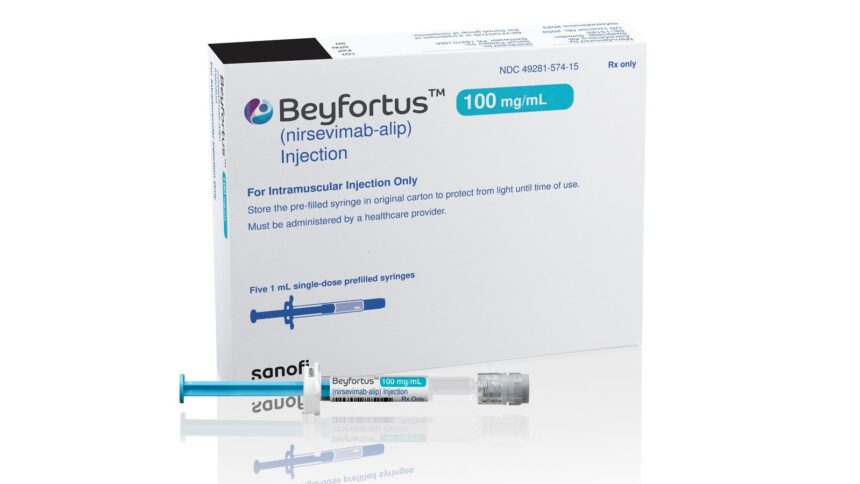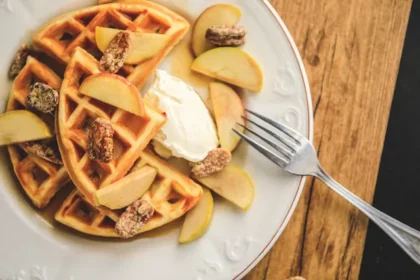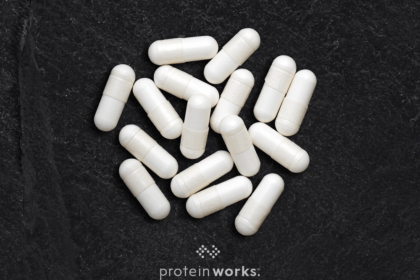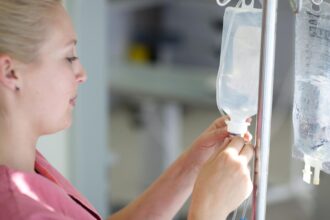Topline
As RSV season approaches, some doses of nirsevimab—the monoclonal antibody RSV immunization for infants—are in a limited supply, so the CDC recommends prioritizing doses for high risk infants and using an expensive, more frequently administered alternative.
This illustration provided by AstraZeneca depicts packaging for their medication Beyfortus. This … [+]
Key Facts
The Centers for Disease Control and Prevention issued an alert on October 23 about a shortage of 100 milligram doses of nirsevimab (brand name Beyfortus), which are typically given to infants weighing over 11 pounds — though 50 milligram dose supplies aren’t affected.
Doctors should prioritize giving 100 milligram doses to high risk infants, which include babies under six months of age and those with underlying conditions.
While 50 milligram doses are not affected by the shortage, the CDC warns doctors not to combine two 50 milligram doses; the smaller doses are intended for infants weighing 11 pounds or less, and the CDC wants to avoid a secondary shortage.
However, if doctors choose to use two 50 milligram doses, the CDC warns some insurance companies may not cover two 50 milligram doses of nirsevimab administered to an individual infant, which has a list price of $495 per dose.
The CDC also recommends using palivizumab, a more expensive monthly shot, for eligible infants aged eight to 19 months whenever possible.
Similar to nirsevimab, palivizumab is a monoclonal antibody, which was approved by the Food and Drug Administration in 1998, and is typically given in once-a-month doses during RSV season to preterm and other high risk infants.
What We Don’t Know
When the shortage may end. Sanofi, in a statement to Forbes, said it was trying to “explore solutions to address this exceptional demand.”
Big Number
2.1 million. That’s how many times American children under the age of five visit the hospital due to RSV infection each year, according to the CDC. The 2022 to 2023 season was especially challenging because around 50.9 people per 100,000 were hospitalized, and most of the patients were children four years or younger. The season’s peak hospitalization rate was two to four times higher than the peaks of recent years.
Key Background
Manufactured by Sanofi and AstraZeneca, nirsevimab is a monoclonal antibody injection—a lab-made protein that gives almost immediate effect—different from vaccines, which train the immune system to battle future infections. It was approved by the FDA in July for infants younger than eight months who are born into their first RSV season, and infants and children up to 24 months who remain vulnerable to severe RSV disease. The vaccine showed an 80% protection rate against severe illness in babies. The drug is covered under the CDC’s Vaccines for Children program, which provides free vaccines to eligible children who otherwise wouldn’t be vaccinated due to an inability to pay. Those eligible are 18 years or younger and are either Medicare eligible, uninsured, underinsured or are American Indian or Alaska Native.
Tangent
There are two FDA approved vaccines designed to protect seniors 60 years and older against RSV and one for infants administered to their pregnant parents, but these groups have also had difficulties getting their RSV shots. The RSV vaccines are covered under Medicare Part D, which covers vaccines as prescription drugs, but may require a vaccine administration fee. However, around 16 million Medicare beneficiaries aren’t enrolled in Part D, so they have to pay for the RSV vaccine out-of-pocket. This has left some patients to pay $330 for their vaccines, the New York Times reports. Even people who have Part D face issues. Since doctor’s offices are reimbursed for administering vaccines under Part B but not Part D, they’re referring patients with Part D coverage to pharmacies to pay for the RSV vaccine out of pocket, but some patients abandon the vaccine at that point.
Surprising Fact
Almost all children will have had RSV by their second birthday, though most infections go away on their own, according to the CDC.
Further Reading
FDA Approves Antibody For RSV After Challenging 2022 Season (Forbes)
FDA Approves Pfizer’s RSV Vaccine For Older Adults—It Could Be Available This Fall (Forbes)
FDA Approves First-Ever RSV Vaccine After Brutal 2022 Season (Forbes)
FDA Approves First RSV Vaccine For Kids—Given To Pregnant Moms—Here’s What To Know (Forbes)
RSV Vaccines Aren’t Covered By Medicare For These Vulnerable Groups (Forbes)









